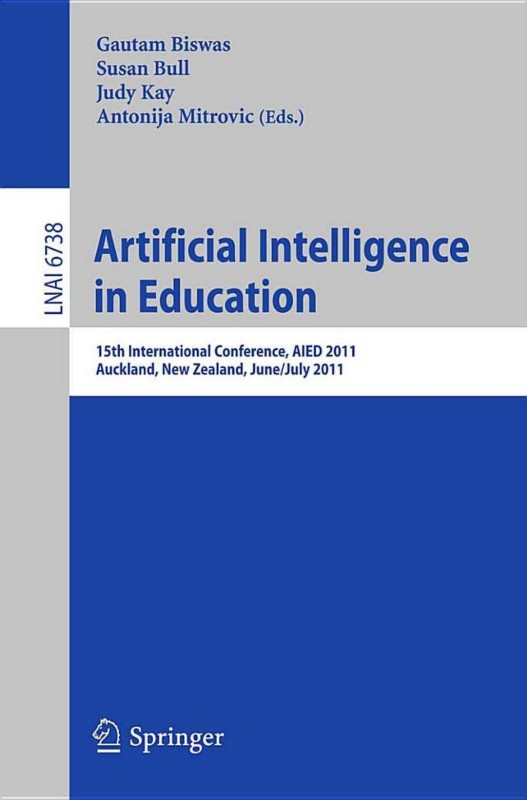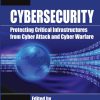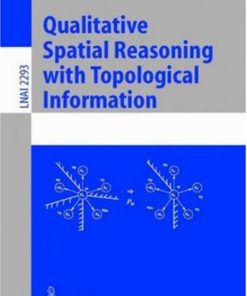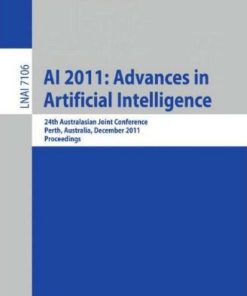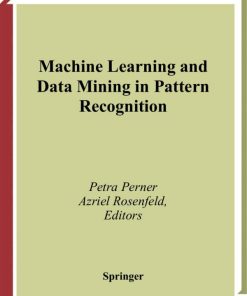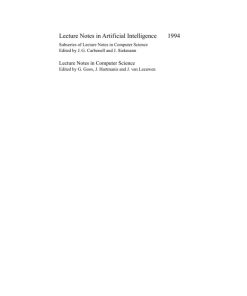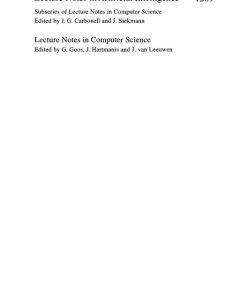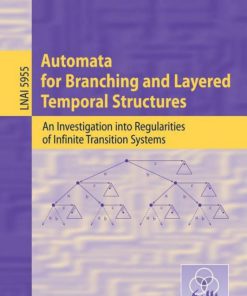Artificial Intelligence in Education AIED 2011 Lecture Notes in Artificial Intelligence 6738 1st edition by Gautam Biswas, Susan Bull, Judy Kay, Antonija Mitrovic 9783642218699 3642218695
$50.00 Original price was: $50.00.$25.00Current price is: $25.00.
Authors:Gautam Biswas, Susan Bull, Judy Kay, Antonija Mitrovic , Tags:Springer 2011 , Author sort:Gautam Biswas, Susan Bull, Judy Kay, Antonija Mitrovic , Ids:3642218687 , Languages:Languages:eng
Artificial Intelligence in Education AIED 2011 Lecture Notes in Artificial Intelligence 6738 1st edition by Gautam Biswas, Susan Bull, Judy Kay, Antonija Mitrovic – Ebook PDF Instant Download/Delivery. 9783642218699, 3642218695
Full download Artificial Intelligence in Education AIED 2011 Lecture Notes in Artificial Intelligence 6738 1st edition after payment

Product details:
ISBN 10: 3642218695
ISBN 13: 9783642218699
Author: Gautam Biswas, Susan Bull, Judy Kay, Antonija Mitrovic
This book constitutes the refereed proceedings of the 15th International Conference on Artificial Intelligence in Education, AIED 2011, held in Auckland, New Zealand in June/July 2011. The 49 revised full papers presented together with three invited talks and extended abstracts of poster presentations, young researchers contributions and interactive systems reports and workshop reports were carefully reviewed and selected from a total of 193 submissions. The papers report on technical advances in and cross-fertilization of approaches and ideas from the many topical areas that make up this highly interdisciplinary field of research and development including artificial intelligence, agent technology, computer science, cognitive and learning sciences, education, educational technology, game desig
Artificial Intelligence in Education AIED 2011 Lecture Notes in Artificial Intelligence 6738 1st Table of contents:
Invited Talks
Metacognitively Guided Study in the Region of Proximal Learning
Multiple Mechanisms for Deep Learning: Overcoming Diminishing Returns in Instructional Systems
Cognitive Load Theory and E-Learning
Reference
Full Papers
Social Communication between Virtual Characters and Children with Autism
Introduction
Background and Project Objectives
The Autism Spectrum and Joint Attention
Virtual Environments for Intervention and Social Scaffolding
The Present Study
Methodology
Design of the Joint Attention Task
Participants and Procedure
Results and Discussion
Reaction Time and Accuracy Data
Qualitative Analysis and Observation
Conclusions and Further Work
References
A Comparison of the Effects of Nine Activities within a Self-directed Learning Environment on Skill-
Interventions within Grockit
Methods
Results
Discussion
References
Towards Predicting Future Transfer of Learning
Introduction
Data Set
Analysis of Model Using Cross-Validation
Feature Engineering
Detector Development
Conclusions
References
Modeling Engagement Dynamics in Spelling Learning
Introduction
Problem Definition.
Methods
Results
Conclusion
References
Assessment of Learners’ Attention While Overcoming Errors and Obstacles: An Empirical Study
Introduction
Related Work
Assessment of Learners’ Attention
Experiment
Results
Conclusion and Future Work
References
Lattice-Based Approach to Building Templates for Natural Language Understanding in Intelligent Tutor
Introduction
The ConceptGrid Approach
The ConceptGrid Interface
Algorithm and Implementation
Results: The xSTAT Project
Conclusions and Future Work
References
Motivational Processes
Introduction
States, Trajectories and Motivational Processes
Gathering Data
Pedagogic Tactics
Expectancies
Values
Meta Level Tutoring
Conclusions
References
Using Tutors to Improve Educational Games
References
A Cognitive Tutoring Agent with Episodic and Causal Learning Capabilities
Introduction
CELTS
Emotional Learning
Episodic Learning
Causal Learning
Experimental Evaluation
Evaluation with Learners
Performance of the Data Mining Algorithms
Conclusions
References
When Does Disengagement Correlate with Learning in Spoken Dialog Computer Tutoring?
Introduction
Computer Tutoring Disengagement Data
Prediction Results
Current Directions
References
Peering Inside Peer Review with Bayesian Models
Introduction
Study, Methods, and Data Sets
Overview of Bayesian Data Analysis
Hierarchical Bayesian Models of Peer Review
Model 5.1a: Contribution of Inbound Peer Ratings
Model 5.1b: Contribution of Information Pooling
Model 5.2b: Contribution of Rating Dimensions
Results and Discussion
Conclusion
References
Modeling Confusion: Facial Expression, Task, and Discourse in Task-Oriented Tutorial Dialogue
Introduction
Related Work
Corpus and Facial Action Analysis
Discussion
Interpretation
Design Implications
Limitations
Conclusion
References
Extending a Teachable Agent with a Social Conversation Module – Effects on Student Experiences and
Introduction
Previous Work
A TA Based Game Extended with Social Off-task Conversation
Aims and Relations to Other Systems
Method
Participants and Procedure
Instruments and Measurements
Results and Analysis
Discussion
References
Text Categorization for Assessing Multiple Documents Integration, or John Henry Visits a Data Mine
Introduction
The Corpus
Pattern Matching
Latent Semantic Analysis
Machine Learning
Related Work
SVMs for Text Classification
Discussion, Future Work, and Conclusions
References
Learning by Problem-Posing for Reverse-Thinking Problems
Introduction
Implementation of MONSAKUN
Interface of MONSAKUN
Task Model
Setting of Problem-Posing Exercises
Diagnosis and Feedback
Experimental Use of MONSAKUN
Learning Effects
Questionnaires
Concluding Remarks
References
Affect Detection from Multichannel Physiology during Learning Sessions with AutoTutor
Introduction
Method
Participants, Materials and Procedures
Computational Models for Affect Detection
Results and Discussion
Discrete Emotions Mapping onto the Dimensional Valence/Arousal Plane
Classification Results from Physiological Signals
Conclusion
References
Short and Long Term Benefits of Enjoyment and Learning within a Serious Game
Intelligent Tutoring and Games
Development of iSTART-ME
Coached Practice and Showdown
Current Studies
Study 1: Short-Term Assessment
Study 2: Long-Term Assessment
Conclusions
References
Error-Flagging Support and Higher Test Scores
Introduction and Experiment
Results
References
Intelligent Tutoring Goes to the Museum in the Big City: A Pedagogical Agent for Informal Science Ed
Introduction
Robot Park
Pedagogical Agents and Informal Science Education
Coach Mike: An Informal Intelligent Tutor
Interpretation at Robot Park
Personality, Body, Animations, and Voice
Implementation
Preliminary Analysis of Visitor Interactions
Conclusion and Future Work
References
Modeling Narrative-Centered Tutorial Decision Making in Guided Discovery Learning
Introduction
Background
Narrative-Centered Tutorial Decision-Making Model
Corpus Collection Environment
Corpus Collection Study Method
Results and Discussion
Conclusion
References
Inducing and Tracking Confusion with Contradictions during Critical Thinking and Scientific Reasonin
Introduction
Method
Manipulation
Participants and Design
Procedure
Results and Discussion
Retrospective Self-report Confusion Ratings
Tracking Uncertainty via Performance on Forced-Choice Questions
Learning Gains
General Discussion
References
Students’ Understanding of Their Student Model
Introduction
Survey with Cognitive Tutor Students
Participants, Materials and Procedure
Results
Discussion
Interview
Participants, Materials and Procedure
Results and Discussion
Future Work and Conclusion
References
Workflow-Based Assessment of Student Online Activities with Topic and Dialogue Role Classification
Introduction
Topic and Dialog Role Classification
SVM Classification Models for Online Discussion Threads
Topic Analysis on Student Online Discussion Text
Assessment Workflows with Text Classification Components
Computational Workflows for Student Learning Assessment
Relating Information Roles with Grades
Relating Questions to Topic Categories
Instructor Feedback
Related Work
Summary
References
Modelling and Identifying Collaborative Situations in a Collocated Multi-display Groupware Setting
Introduction and Related Work
Context of the Study and Data Exploration
Learning Collaborative Behaviour
Evaluation
Conclusions
References
Adapted Feedback Supported by Interactions of Blended-Learning Actors: A Proposal
Introduction
Actors and Interactions in the Current Learning Landscape
SIgBLE – A General Framework
SIgMa: SIgBLE and MAgAdI
Discussion and Conclusions
References
Learning by Teaching SimStudent – An Initial Classroom Baseline Study Comparing with Cognitive Tut
Introduction
SimStudent and the APLUS Learning Environment
SimStudent: A Synthetic Peer Learner
APLUS: An On-line Learning by Teaching Environment
Related Works on Teachable Agent
Evaluation Study
Methods
Tests
Results
Discussion
References
When Is It Best to Learn with All Worked Examples?
Introduction
Method
Results and Discussion
Conclusion
References
Toward Exploiting EEG Input in a Reading Tutor
Introduction
Can EEG Detect When Reading Is Difficult?
Training Procedure
Results
Can EEG Detect Lexical Features?
What EEG Components Are Sensitive, to What Features?
Conclusions
References
Persistent Effects of Social Instructional Dialog in a Virtual Learning Environment
Introduction
Social Informational Dialog
Study
Results
Discussion
References
A Teachable-Agent Arithmetic Game’s Effects on Mathematics Understanding, Attitude and Self-effica
Introduction
Related Mathematic Game Studies
The Teachable Agent Arithmetic Game
Method
Results
Discussion and Conclusion
References
Using Contextual Factors Analysis to Explain Transfer of Least Common Multiple Skills
Introduction
Design
Performance Factors Analysis
Model Versions and Transfer Implications
Analysis of PFA Result (Full Q-matrix)
Analysis of Contextual AFM (CAFM) Result
Analysis of Contextual PFA (CPFA) Result
Conclusions
References
Scenario-Based Training: Director’s Cut
Introduction
Automated Control: The Director Agent
Methods
Raters
Materials
Procedure
Analysis
Results
Discussion
References
Classroom Video Assessment and Retrieval via Multiple Instance Learning
Introduction
Video Understanding in CLASS
Feature Extraction
Multiple Instance Structure and Learning
Experimentation with Human Evaluators
Discussion and Future Work
References
Faster Teaching by POMDP Planning
Introduction
Modeling Teaching as a POMDP
Learner Models
Finding Policies
Empirically Testing Optimized Teaching Policies
Methods
Results
Conclusion
References
Metacognitive Practice Makes Perfect: Improving Students’ Self-Assessment Skills with an Intellige
Introduction
The Self-Assessment Tutor
Methods
Results
Discussion and Summary
References
Self-assessment of Motivation: Explicit and Implicit Indicators in L2 Vocabulary Learning
Introduction
Classroom Study
Motivation Questionnaire
Recorded User Interactions
Learning Measures
Results
Discussion
Conclusion
References
Detecting Carelessness through Contextual Estimation of Slip Probabilities among Students Using an I
Introduction
Carelessness Detection in Cognitive Tutors
Methods
Results and Discussion
Conclusion
References
A “Laboratory of Knowledge-Making” for Personal Inquiry Learning
Introduction
Requirements
An Implementable Representation of the Inquiry Process
Implementation
Healthy Eating Example
Conclusion
References
Early Prediction of Cognitive Tool Use in Narrative-Centered Learning Environments
Introduction
Related Work
CRYSTAL ISLAND
Predicting Cognitive Tool Use
Data Collection
Inductive Framework
Findings
Conclusions
References
Feedback during Web-Based Homework: The Role of Hints
Introduction
Experiments
Experiment-1
Experiment-2A
Experiment-2B
Conclusions and Contributions
References
Transferring Teaching to Testing – An Unexplored Aspect of Teachable Agents
Introduction
Relation to Previous Studies and Present Research Aims
The TA Environment: An Educational Math Game
Method
Participants
Design and Instruments
Procedures
Results
Summative Test Performance in Relation to the Presence of the TA
Students’ Subjective Experiences
Discussion
References
Experimental Evaluation of Automatic Hint Generation for a Logic Tutor
Introduction
Background and Related Work
Hint Factory and Deep Thought Tutor
Experiment
Results and Discussion
Conclusions and Future Work
References
Human-Machine Student Model Discovery and Improvement Using DataShop
Introduction
Human-Machine Student Model Discovery
Using a Discovered Student Model to Redesign a Tutor
Conclusion and Future Work
References
Talk Like an Electrician: Student Dialogue Mimicking Behavior in an Intelligent Tutoring System
Introduction
Method
Data Collection Environment
Procedure
Corpus Annotation
Results
Conclusion
References
Dynamic Guidance for Task-Based Exploratory Learning
Introduction
Related Work
Design Overview
Architectural View
Plan-Based Reasoning
Execution Loop
Experimental Evaluation
Evaluation Environment
Guidance Evaluation: Experimental Design
Guidance Evaluation: Results Analysis
Guidance Evaluation: Discussion
Conclusion
References
Clustering Students to Generate an Ensemble to Improve Standard Test Score Predictions
Introduction
Literature Review
Data
Metrics
Methodology
Clustering
Ensemble Learning
Results
Prediction Models
Averaging Predictions
Contributions
References
Using Automated Dialog Analysis to Assess Peer Tutoring and Trigger Effective Support
Introduction
The Adaptive Peer Tutoring Assistant (APTA)
Method
Effects of Adaptive Support
Effectiveness of Machine Classification
Discussion
References
Evaluating a General Model of Adaptive Tutorial Dialogues
Introduction
EER-Tutor Study
NORMIT Study
Discussion and Conclusions
References
A Reflective Tutoring Framework Using Question Prompts for Scaffolding of Reflection
Introduction
Reflective Tutoring Framework
Proposed Framework
Tutoring Stages
Reflection Types
Self-Efficacy Levels
Empirical Study
Participants and Procedure
Effects of Question Prompts on Development of Self-Efficacy
Effects of Self-Efficacy on Adoption of Question Prompts
Effects of Question Prompts on Elicited Levels of Reflection
Conclusion and Future Work
References
Posters
A Simple Method of Representing Reusable Strategic Knowledge for MT Tutoring
Introduction
Representation of Strategies
A New Formalism of Strategy Representation
Validation Experiments
Discussion
Conclusion
References
COMET: Context Ontology for Mobile Education Technology
Classifying Context Information
Usage Scenario
Conclusion and Future Work
References
Scaffolding to Support Learning of Ecology in Simulation Environments
Introduction
Method
Results and Conclusion
References
Context-Dependent Help for the DynaLearn Modelling and Simulation Workbench
Introduction
Help Modes
Implementation
Concluding Remarks
References
Evaluation of WebxPST: A Browser-Based Authoring Tool for Problem-Specific Tutors
Introduction
The xSTAT Project
Results
Discussion
References
Gesture-Based Affect Modeling for Intelligent Tutoring Systems
Introduction
Gesture Modeling, Tests and Preliminary Results
Data Collection, Feature Extraction and Model Building
Feature Extraction and Model Building
Observations, Preliminary Results and Analysis
Gestures and Academic Emotions
User-Specific and Stereotype Gesture-Based Models
Concluding Remarks
References
Turn on the TV to turn off the TV: An Application of Adaptive Learning Television to Discuss the Tel
Introduction
Television and Learning
An Adaptive Television Program to Discuss the Television
References
Scaffolding Metacognitive Processes in the Ecolab: Help-Seeking and Achievement Goal Orientation
Introduction
Ecolab
Method
Results
Discussion
References
Learning with ALEKS: The Impact of Students’ Attendance in a Mathematics After-School Program
Introduction
Methods
Results and Discussion
References
Predicting Human Scores of Essay Quality Using Computational Indices of Linguistic and Textual Featu
Introduction
Methodology
Results
Discussion
References
ProTutor: Historic Open Learner Models for Pronunciation Tutoring
Introduction
Related Literature
System Overview
System Evaluation and Results
Conclusions and Future Work
References
Does Self-Efficacy Matter When Generating Feedback?
Introduction
Design of Study
Results and Conclusion
References
Physiological Evaluation of Attention Getting Strategies during Serious Game Play
Introduction
Procedure
Results
Conclusion
References
Does Topic Matter? Topic Influences on Linguistic and Rubric-Based Evaluation of Writing
Introduction
Methods
Results and Discussion
Conclusions
References
Thinking with Your Hands: Interactive Graphical Representations in a Tutor for Fractions Learning
Introduction and Method
Results and Conclusion
References
Classification Techniques for Assessing Student Collaboration in Shared Wiki Spaces
Introduction
Wiki Document Classification and Assessment Using Labeled LDA Topic Model and Descriptive Statistics
Comparison of LLDA and Descriptive Statistics Results
Comparison of Wiki Activity Timeline
Conclusion
References
A Common Model of Didactic and Collaborative Learning for Theory-Aware Authoring Support
Introduction
A Common Model of Didactic and Collaborative Learning
A Theory-Ware Authoring Support for Blended Learning
Conclusion
References
Carelessness and Goal Orientation in a Science Microworld
Methodology
Results
Summary
References
Kit-Build Concept Map for Automatic Diagnosis
Introduction
Practical Flow of KB Map Building
Conclusion
References
The Effects of Domain and Collaboration Feedback on Learning in a Collaborative Intelligent Tutoring
Introduction
Evaluation
Conclusion
References
Multimodal Affect Detection from Physiological and Facial Features during ITS Interaction
Introduction
Computational Model and Results
Conclusion
References
Students’ Enjoyment of a Game-Based Tutoring System
iSTART-ME
Evaluation of iSTART-ME
Conclusions
References
Optional Finer Granularity in an Open Learner Model
Introduction
MusicaLM
Evaluation
Discussion and Summary
References
Contextualized Reflective Support in Designing Instruction Based on Both Theory and Practice
Introduction
The I_L Event Decomposition Tree and Reflective Support
Related Work and Conclusions
References
Problem-Solution Process by Means of a Hierarchical Metacognitive Model
Introduction
Metacognitive Model’s Baseline
Metacognitive Phenomena
Two Abstraction Levels Architecture
Skills Acquisition Workflow
A Profile of the Metacognitive Model
Metacognitive Learning Paradigm
Cognitive Model for Problem-Solving
Double-Loop Cognitive Model
Conclusions
References
Modeling Mentoring Dialogue within a Teacher Social Networking Site
Introduction
Annotation and Analysis of Teacher Online Discussions and Blogs
Summary
References
Sentiment-Oriented Summarisation of Peer Reviews
Introduction
Sentiment-Oriented Summarisation (SOS)
Evaluation and Discussion
Conclusions
References
Design Dimensions of Intelligent Text Entry Tutors
Introduction
Design Dimensions
Conclusions
References
SMART: Speech-enabled Mobile Assisted Reading Technology for Word Comprehension
Introduction
System and Game Design
Experiment and Early Results
References
Enhancing the Error Diagnosis Capability for Constraint-Based Tutoring Systems
Introduction
A Weighted Constraint-Based Model For ITS
Conclusion
References
Question Taxonomy and Implications for Automatic Question Generation
Introduction
A Case Study
Future Work on Automatic Question Generation Framework
References
Agent-Mediated Immersion in Virtual World: The Implications for Science Learning
Introduction
Empirical Study
Results
Conclusions and Future Work
References
Virtual Manipulatives in a Computer-Based LearningEnvironment: How Experimental Data Informs the De
Introduction
Description of Virtually Fractions
What the Data Tell Us about Different Learners
Designing a New Instructional Model for a More Sophisticated CBLE
References
Typed versus Spoken Conversations in a Multi-party Epistemic Game
Introduction
Method
Results and Discussion
General Discussion
References
Statistical Relational Learning in Student Modeling for Intelligent Tutoring Systems
Introduction
A Common Language for User Modeling
Lifted User Models
Statistical Relational Learning for more Expressive User Models
User Models That Leverage Social Network Analysis
Alternatives
Challenges
Summary
References
Use of the DynaLearn Learning Environment by Naïve Student Modelers: Implications for Automated Sup
Introduction
Case Study Design
Results
Discussion
References
Learning on Semantic Social Networks: A Distributed Description Logic-Based Approach
Introduction
Connecting Learning Resources in Semantic Social Networks
Model of Learning Resources
Model of Inter-connections between Learning Resources
Distributed Reasoning Over Connected Member Ontologies
References
Generating Task-Specific Next-Step Hints Using Domain-Independent Structures
Introduction
Hint Generation
Results
Conclusion
References
Causal Modeling of User Data from a Math Learning Environment with Game-Like Elements
Introduction
Interpretation of Model: Causal Claims and Causal Inference
References
Facilitating Communication with Open Learner Models: A Semiotic Engineering Perspective
Introduction
Open Learner Models for Communication in School Settings
The Requirement for Continuous Semiosis
References
When Off-Task is On-Task: The Affective Role of Off-Task Behavior in Narrative-Centered Learning Env
Introduction
Investigating Off-Task Behavior in CRYSTAL ISLAND
References
Evaluating the Use of Qualitative Reasoning Models in Scientific Education of Deaf Students
Introduction
Methodological Aspects of Evaluation
Results
Discussion and Final Remarks
References
$TORMES$ Methodology to Elicit Educational Oriented Recommendations
$TORMES$ Methodology
Eliciting Educational Oriented Recommendations
Discussion
References
Will Structuring the Collaboration of Students Improve Their Argumentation?
Introduction
Research Design
Results and Conclusion
References
Investigating the Relationship between Dialogue Responsiveness and Learning in a Teachable Agent Env
Introduction
Classroom Study and Results
Conclusion
References
Using Graphical Models to Classify Dialogue Transition in Online Q&A Discussions
Introduction
Characterizing Successful vs. Unsuccessful Threads with a State Transition Model
Experiment and Discussion
References
An Integrated Framework as a Foundation to Develop Meta-learning Support Systems
Introduction
Meta-learning Process Model
Design Concepts for Meta-learning Support Scheme
Integrating Meta-learning Process Model and Design Concepts
Concluding Remarks
References
Managing the Educational Dataset Lifecycle with DataShop
Introduction
The Educational Dataset Lifecycle
References
Eliciting Intelligent Novice Behaviors with Grounded Feedback in a Fraction Addition Tutor
Grounded Feedback and the Intelligent Novice
The Grounded Feedback Tutor
The Fraction Addition Think Aloud
References
Competence-Based Knowledge Space Theory as a Framework for Intelligent Metacognitive Scaffolding
Introduction
Adaptive Metacognitive Scaffolding
Conclusion
References
Emotion Regulation during Learning
Introduction
Method
Results
General Discussion
References
Towards a Physical and Personal Math Coin Tutoring System
Introduction
Research Challenges
References
Does Supporting Multiple Student Strategies in Intelligent Tutoring Systems Lead to Better Learning?
Introduction
Experiment
Results
Discussion / Conclusion
References
Observations of Collaboration in Cognitive Tutor Use in Latin America
Introduction
Patterns of Use in Collectivist Cultures
Augmenting Cognitive Tutor Design
References
Cohesion / Knowledge Interactions in Post-tutoring Reflective Text
Study Design, Results and Discussion
References
Ontology-Supported Scaffolding of Concept Maps
Introduction and Background
Implementation
Conclusion
References
Character Roles and Interaction in the DynaLearn Intelligent Learning Environment
Introduction
The Characters in DynaLearn
Conclusion
References
Effects of Adaptive Prompted Self-explanation on Robust Learning of Second Language Grammar
Introduction
Methodology
Results
Discussion
References
Corpus-Based Performance Analysis for Automatically Grading $Use of Language$ in Essays
Introduction
Grading Use of Language
L2 Learner Corpus Experiment
Procedure
Results
Discussion and Conclusions
References
Evaluating the Effects of a New Qualitative Simulation Software (DynaLearn) on Learning Behavior, Fa
Introduction
Evaluation Methodology
Results
References
Young Researcher’s Track
Encouraging Students to Study More: Adapting Feedback to Personality and Affective State
Introduction
Aims and Objectives
Methodology and Work to Date
References
Motivational and Metacognitive Feedback: Linking the Past to the Present
Introduction
Aims and Objectives
Methodology
Current State, Expected Contribution and Future Work
References
Defining Solution Boundaries for EDM Vis
Introduction
Aims and Objectives
Methodology
Contributions
References
Automatic Generation of Deductive Logic Proof Problems
Introduction
Deep Thought
Current Work
Future Work
References
The MetaHistoReasoning Tool: Fostering Domain-Specific Metacognitive Processes While Learning throug
Theoretical Framework
Learning Issues
Research Proposal
Research Hypotheses
Research Design
Broader Impact of Proposed Research
References
Automatic Identification of Affective States Using Student Log Data in ITS
Introduction
Related Work
Proposed Methodology
System
Modeling the Affective States
Validation of the Affective States Model
Future Work
References
Training Emotion Regulation Strategies During Computerized Learning: A Method for Improving Learner
Introduction
Background and Previous Research
Future Research Plans
References
Interactive Events
Interactive Events Summary
Knowledgeable Feedback via a Cast of Virtual Characters with Different Competences
References
Adaptive Intelligent Tutorial Dialogue in the BEETLE II System
References
Authoring Step-Based ITS with ASTUS: An Interactive Event
Learning by Teaching SimStudent – Interactive Event
Reference
Monkey’s Revenge: Coordinate Geometry Learning Environment with Game-Like Elements
Knowledge Construction with Causal Concept Maps in a Teachable Agent Environment
Reference
An Educational Math Game with a Teachable Agent and a Social Chat
Reference
$Inquire$ for iPad: A Biology Textbook That Answers Questions
Reference
DataShop: A Data Repository and Analysis Service for the Learning Science Community (Interactive Eve
Reference
Annie and FixIt: Showcasing Dynamic Guidance for Task-Based Exploratory Learning
References
Facilitating Adaptive Tutorial Dialogues in EER-Tutor
Reference
Workshops
$First Workshop on$ Artificial Intelligence in Education to Support the Social Inclusion of Communit
$International Workshop on$ Learning by Modelling in Science Education
$International workshop on$ Authoring Simulation and Game-Based Intelligent Tutoring
Author Index
People also search for Artificial Intelligence in Education AIED 2011 Lecture Notes in Artificial Intelligence 6738 1st :
artificial intelligence in education definition
artificial intelligence in education examples
artificial intelligence in education book
artificial intelligence in education 2023
You may also like…
eBook PDF
Lecture Notes in Artificial Intelligence 1st edition by Acar Savaci ISBN 3540367136 978-3540367130

